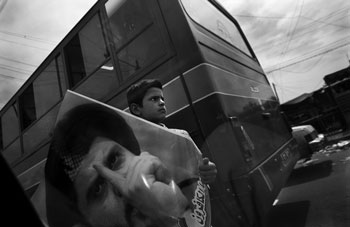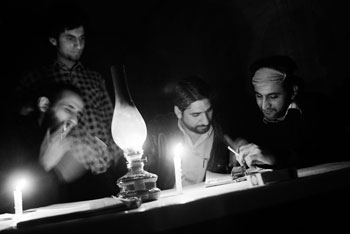It has been almost a year since I left Paris on a one-way ticket to Amman. A year of many lives, many encounters, much luck and perseverance. A year to reach Baghdad. A year of growth in a new family I only dreamed of joining. A year to start understanding the reality of conflict photography.
Immediately following the wave of foreign hostage taking in Fallujah and Nasariyah, my family and friends flooded me with emails and phone calls. Not easy to explain to my eight-year-old nephew that what he sees on TV can be a distortion of reality. No the entire country is not in flames, no they are not systematically hunting foreigners, yes the majority of Iraqis try to live normally.
I hear an explosion. I don't see it. I run in the street. I ask. In the rush I forget to cover my head. People stare. Kids throw insults.
I ask again. Though it is only two blocks away, no one seems to know till one-man point in the right direction. That evening, television stations the world over will paint a picture of chaos. Two blocks away though, people keep on living.
Photographers are sitting around the table for the 10TH time, enjoying Franco Pagetti's carbonara when Olivier Jobard shows up and tells of his five-day long stay in Fallujah. He went in, we didn't. Are we happy for him? Or disappointed in us? Both. We are a community sharing the same food in the same hotel, yet our assignments are so different.
 |
An Iraqi boy, Sadr City AP Photo/Benedicte Kurzen |
I am busy illustrating Remi Ourdan's paper for Le Monde, portraying an American expert in archeology for the Boston Globe Sunday Magazine and chasing Iraqi returnees for the Sydney Morning Herald. I'm frustrated listening to Olivier's tail of being blindfolded by US troops. I wish I'd been there not to be blindfolded, but to see with my own eyes. Photographers compete. We each add our piece to the puzzle, and as a group, portray the country the way it really is.
Tonight, I am too lazy to take off the Abaya I wore all day long in Sadr City. "You must be from Iran," whisper Iraqi women. "Your skin is light.." It is true that the full black dress and headscarf let me pass for a foreign Muslim.
Six pm. I reach an old preserved Baghdadi house, a stark contrast with the surrounding concrete Stalin-style high rises that mushroomed in Saddam's time. Oday opens the door and breaks up in laughter seeing my outfit. He and his crew have selected this island of peace and tranquility on the shores of the Tigris to wrap up the night scenes of "Underexposure," the feature film they are shooting in Baghdad. I am on assignment for Le Monde, for the last of a three part series on Baghdad intellectuals.
 |
Oday Rasheed with his production team on location in Baghdad Photo by Benedicte Kurzen |
In a matter of seconds, I take off my abaya, and become again a young women in large pants and tight T-shirt. Comfortable, without the pressure of the presence of a reporter, I start working, a fly on the wall. I don't notice night falling.
I share the crew's meal, sitting on the floor in the patio, lit by candles and petrol lamps. Electricity went out an hour ago, and no one knows when it will come back. The pictures are not the ones I planned for. It doesn't matter. One has to adapt. Bassam grabs a cello and plays old Iraqi songs, written during the former regime, and transformed into an improvised farce. Time flies, it is close to 10pm, and though nothing really happened, I've already shot over 500 frames.
From time to time, explosions can be heard at a distance. "Baghdad music!" ironises Oday. It is 11pm, still no electricity, I have to leave. The streets of Baghdad at night are quite dangerous. Madged the driver is not too keen on coming back to fetch me. But he does. I feel sorry not to have photographed the movie being shot. But I have different and unexpected pictures.
There is not a soul in the dark streets. As we reach the concrete blocks surrounding the Palestine hotel, I hear a loud explosion. Moments later, I learn through my colleagues at the Palestine that a rocket landed on Haifa Street. Near that old house. Baghdad Music..
We're no heroes. We get up in the morning, we work, we eat, we sleep. We all love our work too much. We don't really share the lives of the people we photograph, Iraqis or coalition soldiers. And we don't really share the lives of folks back home either.
BENEDICTE KURZEN is a 24-year-old French photojournalist who arrived in Baghdad early March without any assignment. She has since then been published in numerous magazines and newspapers around the world.

